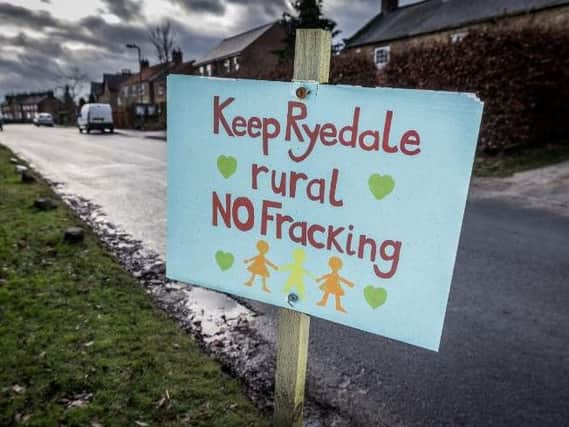Fracking could see home insurance premiums rise for thousands in Yorkshire


Officials from insurance price comparison websites MoneySuperMarket and Compare The Market separately said today that house insurance prices could be affected once the precise impact of the fledging industry in England becomes more clear.
It comes after a letter sent by the Department for Business, Energy & Industrial Strategy to a resident living close to a planned shale gas exploration project in Rotherham and seen by The Yorkshire Post said: “The Association of British Insurers have confirmed that ‘any potential damage as a result of fracking, such as earthquakes, subsidence, heave and landslip are all covered in general, under buildings insurance’. In addition to insurance cover, landowners could bring a claim against the company if their activities caused damage to their property.”
Advertisement
Hide AdAdvertisement
Hide AdFracking, which is supported by the Government as a way of reducing the nation’s reliance on imported energy and involves the use of a high-pressure mixture of water and chemicals to release shale gas from rocks deep underground, has not taken place in the UK since 2011 when test drilling operations in Lancashire were deemed to have triggered earth tremors.
Seven companies have been granted exploration licences to see if fracking is feasible in Yorkshire.
Thousands of properties are expected to be affected but Government regulator the Oil and Gas Authority, which handed out dozens of exploration licences for 10km by 10km areas of Yorkshire, says it does not hold information about the number of homes in areas where work is possible.
Kevin Pratt, consumer affairs expert at MoneySuperMarket, said: “One of the problems with fracking is that no-one is able to say how much damage it will cause to nearby properties, if any. Insurers will pay out for buildings damaged by earthquake or subsidence, so householders in fracking locations can cross that particular worry off their list, at least for the time being.
Advertisement
Hide AdAdvertisement
Hide Ad“Problems would eventually arise if a particular area became a claims hotspot because of fracking.
“Insurers set their prices with reference to the number, size and type of claim in any given postcode, so anyone with an address in an area recording a lot of claims would see their premiums increase.
“They might also face a higher policy excess – the amount they have to pay towards the cost of any claim they make.
“On top of this, if the number of claims in an area were to rise to a high level, insurers might change the definition ‘earthquake’ specifically to exclude events directly attributable to fracking.”
Advertisement
Hide AdAdvertisement
Hide AdChris King, Head of Home Insurance at Compare The Market, said: “Damage from subsidence, heave and landslip – which could occur as a result of fracking – are traditionally covered under home insurance policies.
“However, it’s important to note that due to the significant costs of these claims, the excess is often much higher.
“Insurers tend to use previous risk data to access the likelihood of a claim and so, as fracking has failed to really accelerate over the past couple of years, it’ll be a task for providers to calculate the effect this will have on premiums.
“It may take months – or even years – for insurers to collect the relevant information they need, but if an area becomes at high risk of subsidence as a result of fracking, it is likely that premiums will eventually increase.”
Advertisement
Hide AdAdvertisement
Hide AdBut the Association of British Insurers said today that “there is, at present, little evidence to show a link between fracking and seismic activity that could cause damage to a well-maintained property” and it was not aware of any claims where fracking has been suggested as a potential cause of damage.
In July 2015, a draft Government report published under Freedom of Information laws suggested house prices for properties close to fracking sites could fall by up to seven per cent and said homes within five miles of such sites may see their insurance costs rise “to cover losses in case of explosion on the site”. The Government, which was forced into publication following an appeal to the Information Commissioner, distanced itself from the report when it was released, describing it as an early draft which was “not analytically robust”.
Compensation claims 'may prove difficult'
Homeowners living close to fracking sites may struggle to successfully claim compensation if they believe their properties have been damaged through vibration caused by lorries repeatedly travelling past their houses, it has been warned.
Kevin Pratt, consumer affairs expert at MoneySuperMarket, said: “Such damage to the fabric of a building is not usually covered by insurance because it is a problem that emerges gradually over the course of many years. Proving that fracking traffic was entirely to blame would also be difficult, so it is likely householders would struggle to get any compensation.”